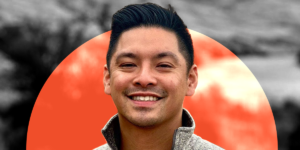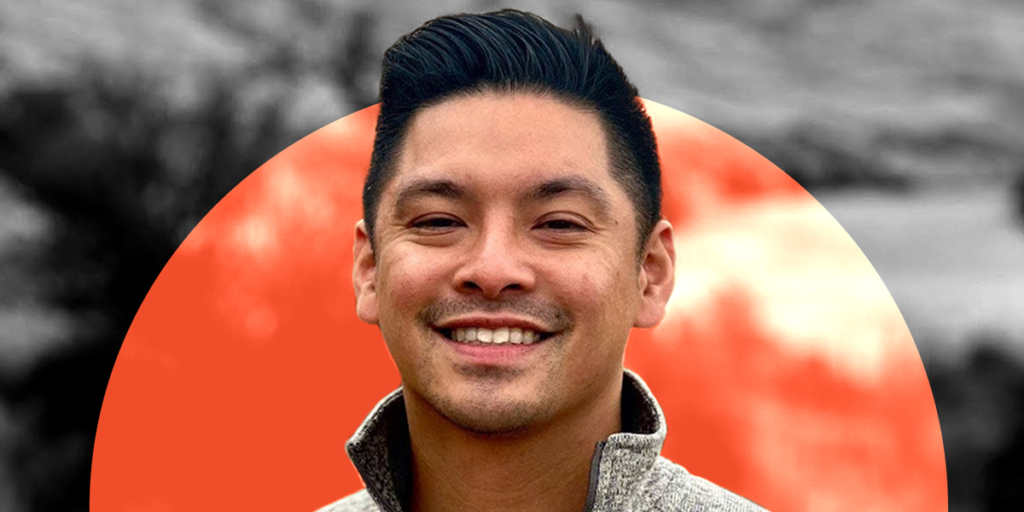IN 2018, Vuong Tran, 32, was experiencing what felt like an impossibly dark depression and he attempted to end his life. When he survived his suicide attempt, he wasn’t sure where he fit in or what to do next. Men’s Health spoke with Tran about community, generational trauma, and his volunteer work with the American Foundation for Suicide Prevention.
I WAS BORN and raised in Massachusetts, but I had moved to San Diego and gone through a breakup. After that breakup, I had intense feelings of shame and being a burden. Over several months, these feelings grew. I felt like a bad person, and I couldn’t fix things. The shame started to tell me I was better off not being part of this world anymore. I was only 25. I had a plan for my suicide, and I attempted to end my life.
But when I survived, I didn’t know what to do. In my mind, I wasn’t supposed to be alive. I had been kind of dabbling in my local church at the time, and it popped into my head that on one particular Sunday they had mentioned a form of ministry called Soul Care.
It was an opportunity to speak one-on-one with a counselor at the church, in a safe environment where you can talk about whatever you’re struggling with. It was the only resource I had ever really heard of for anybody who was struggling mentally, so I sent them an email and met with a counselor.
I ended up going to a psychiatric hospital for five days. That’s where my recovery really began. It was an opportunity for me to experience people caring about my mental wellbeing and to connect with others who were also struggling. It was an environment of total empathy and compassion, and I hadn’t really experienced that before.
It showed me the importance of community. Before then, I had mostly been on my own, and I had never really had conversations about my mental health. I felt like I had been missing out on this all along.
Building Community Helped Me Understand Myself
I JOINED SEVERAL community and church groups after my hospital stay to keep growing my network, including a young professionals group and a hiking group. It was so important to me to be in a community of people who care and are vulnerable and talk about hard things, but also encourage one another and pray for each other.
Therapy helped me unpack the ideas that I had of not being good enough, of being a burden, of feeling shame. I also started antidepressants to get me moving in the recovery process.
Once I got into a really good spot where it felt like I was stable, I started looking for a volunteer opportunity in suicide prevention. I wanted to further my recovery in a community of people who are either attempt survivors or who have lost somebody to suicide. I did a Google search, found the American Foundation for Suicide Prevention, and sent them an email asking how I could get plugged in there.
My volunteer work is a way to reduce stigma and spread resources. No one ever talked about mental health or suicide prevention in my family or while I was growing up. The only resource I knew to turn to was the church. Now, I like to share information about the 988 Lifeline and the Crisis Text Line.
Sometimes I wonder what would have happened if I had reached out to a crisis hotline. If I knew about them, would I still have gone through with my suicide attempt? No one knows, but it probably would have been helpful to know about other resources when I was struggling.
I think talking about suicide in a public setting reduces the stigma, too. It’s not a bad thing to talk about our mental health or suicide prevention. It’s something that actually needs to be spoken about more, so that we can normalize those conversations, and so people who are currently struggling know we are safe people to speak with.
Learning How to Open Up
I COME FROM an immigrant family. My parents came to the United States right after the Vietnam War. Growing up, my parents were more focused on my sisters’ and my physical survival—actually getting food on the table, working 12-hour shifts to afford the mortgage—than our feelings. Their way of showing they cared for us was by asking us if we’d eaten yet.
They did what they could at the time with what they had. And our family dynamic is still pretty similar. We don’t have many conversations about each other’s mental health. We haven’t talked about my suicide attempt. And I think that’s OK for my family, because I have other support systems in place where I can have those conversations.
In my church community group, we usually open with “How’s everybody doing?” and there was a moment where I decided I would tell them I was struggling. I felt like I was going down a slippery slope with my mental health. I told them I had already contacted my physician and let them know I might need to go back on antidepressants or start therapy again.
In the moment, they encouraged me and prayed for me, and until the next meeting, some of them even checked in on me over text. If I hadn’t spoken up about my mental health, I wouldn’t have had the opportunity to put this support system in place to help me through that journey.
I’m also in a non-religious men’s group. We all met on the app Nextdoor during the COVID lockdowns. What initially brought us together was the fact that men were more lonely than ever. We’ve been meeting ever since. We can still go to a bar with a bunch of TVs, but we’ll talk about loneliness, depression, shame, and how to make friends.
These conversations require vulnerability, which can feel like it goes against the grain of stoic masculinity. In order to talk about your mental health, you do have to open up your heart a little and be raw and honest with a safe person who’s going to listen to you with compassion. I think it’s important to find your own balance of what might typically be considered masculine traits and vulnerability, honesty, and an ability to talk about your feelings, too.
And we have to face the fact that not talking about mental health is hurting men. Men make up almost 80 percent of all suicides, and 1.5 million Americans attempt suicide each year. If we want to stop men from dying by suicide, it starts with a conversation about our mental health with a safe person who will listen.
I live in Portland, Oregon now, and I’ve established a life here that supports my mental and physical health. In addition to my community, I lean on physical activity. I was a division one track and field athlete in college, and I’ve been weightlifting and running regularly since. I go to the gym or run outside at least three times a week. I work from home as an implementation consultant for a software company, and getting out of my apartment is crucial for my mental health. I’ll go for walks in local parks or on trails by the river that’s only five minutes away.
I also start my mornings off with a little bit of silence and solitude. What that looks like is not scrolling immediately, but having a cup of coffee on the couch in prayer and gratitude before I hop into the office to work. I use a whiteboard in my office to jot down different thoughts when life feels overwhelming. And I use the speech-to-text feature on my phone to verbally process my feelings, almost like journaling.
Breaking the Cycle of Generational Trauma
I WANT OTHER Asian American folks or other kids of immigrant parents to acknowledge that many of us didn’t grow up having these kinds of conversations, which can make it harder to open up. We can make a difference by starting these conversations and healing.
My fiancée and I plan to have children one day, and I think about how I would approach mental health with my kids differently from my parents. They didn’t have the luxury of doing this, but I hope to be able to spend more quality time with my kids, and ask them how they are doing, how they are feeling, and how their day is going. I think it starts by giving them that space to open up. I also plan to nurture a vocabulary that includes a lot of emotions, so they learn to be specific with their language and build emotional intelligence.
I want to create a world in which people, especially those of color, can openly have conversations about mental health and suicide prevention. I think it can start on the micro level, with communities like my men’s group as an example. Getting people together to have coffee or a drink and an intentional conversation. It doesn’t have to be so deep, as in, “Hey, what’s your trauma?” But simple conversation starters like “How are you feeling?” or “What’s been on your mind lately?” can help you get to know someone on a deeper level.
On the macro level, I think it’s important to see more diversity in mental health organizations and in media portrayals. It’s powerful to think “this person actually looks like me, and they’re talking about their mental health.”
While it might seem scary or overwhelming to talk about your mental health, reaching out to others may help you find a safe and supportive community that will support you. I think doing so is an opportunity to save lives.
Sarah Klein is a Boston-based health journalist and certified personal trainer with more than 15 years of experience in publishing, including at LIVESTRONG.com, Health.com, Prevention, and The Huffington Post.
Read the full article here



